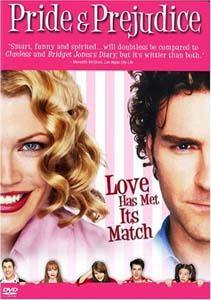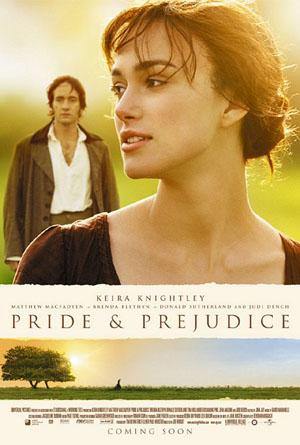Bride and Prejudice: Bollywood's Pride and Prejudice extravaganza!
It is a truth universally acknowledged, that a single man in possession of a good fortune must have no life without wife.

Obviously, something was lost in translation between the 1813 novel and the 2004 film, but the sentiment in Jane Austen’s Pride and Prejudice and in Gurinder Chadha’s Bride and Prejudice is the same. Society, our audience, has expectations of us all. We can conform, like Charlotte Lucas, and be granted a modicum of respect, however grudging, from the Lady Catherines of the world. Or we can do the unexpected, like Lizzie Bennet, and brave the wrath that is sure to follow. There’s a heavy price to pay either way.
The modern filmmaker is given a similar choice when she dares to adapt Jane Austen. She can attempt a period piece costume drama with bonnets and riding boots, as in the Keira Knightley/Matthew Macfadyen Pride and Prejudice. However, in attempting to meet the purist expectations of the novel’s most ardent admirers, the filmmaker is practically guaranteed to fail. Some history buff or another will note a flower blooming in the background that failed to make its way to England until say 1830. Someone else will take issue with the colour of a dress, that dye not being available before 1860, and another person will be absolutely appalled by the actresses’ makeup. Or, the filmmaker can flaunt convention and blaze a new trail, like Frank Sinatra crooning “I did it my way.”
Not only has Bend It Like Beckham director Gurinder Chadha taken the road less traveled, Chadha has chosen to boldly go where no man has gone before. She takes Jane Austen to Bollywood, and we should all be grateful that she did. Like Bridget Jones’s Diary and Clueless, Bride and Prejudice is not a line by line reenactment of the novel. It is an enjoyable romp under the guise of what if Jane Austen’s characters were living in our modern world? The answer seems to be that they would do and say very much the same things.
This reaffirmation of the human spirit has to be reassuring to the viewer, and it seems unlikely that dear Aunt Jane would be much surprised to find us so little altered in 200 years, or 2,000 miles. The fact that this is a musical may be off putting at first, but then the dance scenes are a bit reminiscent of the Netherfield Ball, at times. It may be exhausting to watch so much Bollywood spectacle, but then Regency dancing is an aerobic workout as well, as anyone who has tried it knows. Continent hopping may also seem over the top. The film travels from India to England and then onto America, then back to India, but there is quite a bit of traveling in the novel, from house to house, country to city, London to Pemberley, back to Longbourne, back to London, back to Longbourne. Pity the poor horses! There is more action in the novel than many readers remember. 
Aishwarya Rai is stunningly beautiful with perhaps distractingly perfect features. She seems more Cinderella than Elizabeth Bennet. And, regrettably, Martin Henderson is just not quite right as Mr. Darcy. For one thing, he lacks Darcy’s arrogance. Blind prejudice is not quite the same flaw. But then Bridget Jones’s Renee Zellwegger is no more Elizabeth Bennet than Clueless’s Alicia Silverstone is Emma Woodhouse. Apparently, intelligence is not much valued in modern movie heroines. Fortunately, Lalita Bakshi (Elizabeth Bennet) is an exception. She is allowed to retain her wit and her propensity to unleash a very cutting remark when the occasion calls for one. Aishwarya Rai and Martin Henderson may not be the ideal pairing as Elizabeth Bennet and Mr. Darcy, but there is something to be said for willing suspension of disbelief, and the rest of the casting is impeccable. As Rudyard Kipling would have it,
Mr. Bennet’s lady and Judy (Bashki) O’Grady are sisters under their skins. Put her in a sari and place her in India if you will, but, much to her daughters’ chagrin, Mrs. Bennet will not be repressed. Nadira Babbar is absolutely superb as Mrs. Bakshi (Mrs. Bennet). Mrs. Bakshi’s poor nerves are torn to shreds throughout the film, and everyone is made to know how she suffers. When the beautiful, cool, elegant and haughty Indira Varma (Miss Bingley), at her insufferable best, shows her English house to the Bakshi ladies, Babbar’s reaction alone is worth the price of the theatre ticket.

Another stroke of pure genius was casting Nitin Ganatra as Mr. Kohli (Mr. Collins). A green card, a good job and a new house in America have completely turned Mr. Kohli’s head, and Ganatra is delightful as the overly confident bachelor attempting to woo the wrong woman. When the rejected suitor leaves the Bashki house in a huff, your humble servant was seized by a fit of hysterical laughter, an uncommon occurrence among graying academics. Chadha has an endearingly soft touch when dealing with some of the characters. She takes a benevolent view of Mr. Bennet, Anupam Kher as Mr. Bashki, and emphasizes the close, loving relationship between father and daughters.
Chadha also empathizes with Charlotte Lucas, Sonali Kulkarni as Chanda, and reconciles us to her fate. There is a very wise and perceptive novel reader behind these characterizations, and, to the ardent Janeite, Chadha proves to be a soul mate. Too many adaptations have thrown these unforgettable characters away for a cheap and hollow laugh. Unhappily, in translating the novel into film, characters, scenes and dialogue must be sacrificed to render a 300 page book down into a two hour film. One of the primary reasons the Jennifer Ehle/Colin Firth film version of Pride and Prejudice was such a triumph was because screenwriter Andrew Davies had five hours to unfold the story. Writing in musical numbers only adds to the problem. Daniel Gillies, as Mr. Wickham, has little to do in Bride. This particular viewer was longing to see more of the suave and devastatingly handsome Naveen Andrews as Mr. Balraj (Mr. Bingley).
We are only given enough of Naveen Andrews to get our blood pumping. Lady Catherine de Bourgh is given very short shrift, one nearly despairs of her appearance altogether, and the Bakshis are one daughter short, but the audience is inclined to forgive Chadha as she does such a brilliant job with the rest of the supporting characters. Bride and Prejudice is fast paced and laugh out loud funny. It will only augment, not replace, your personal copy of the Jennifer Ehle/Colin Firth Pride and Prejudice, and we all have one. Bride only feeds the insatiable appetite of Austen fans. Viewing the film with another Austen admirer will only enhance your enjoyment, so feel free to run mad with laughter as often as you choose, but do not faint. You do not want to miss Mrs. Bakshi and Mr. Kohli!
______________________________
Unveiled earlier this fall in Bath, UK (The Jane Austen Festival) and California (The Jane Austen Society's Annual General Meeting) the film is currently playing in theatres across Europe. USA release is set for December 24, 2004 in select theatres. Visit the Official Site for trailers and sneak peeks. In the mean time, check out Kandukondain Kandukondain, Bollywood's Sense and Sensibility from 2000.
Sheryl Craig is an Instructor of English at Central Missouri State University. She is currently pursuing a PhD at the University of Kansas.



Leave a comment
This site is protected by hCaptcha and the hCaptcha Privacy Policy and Terms of Service apply.